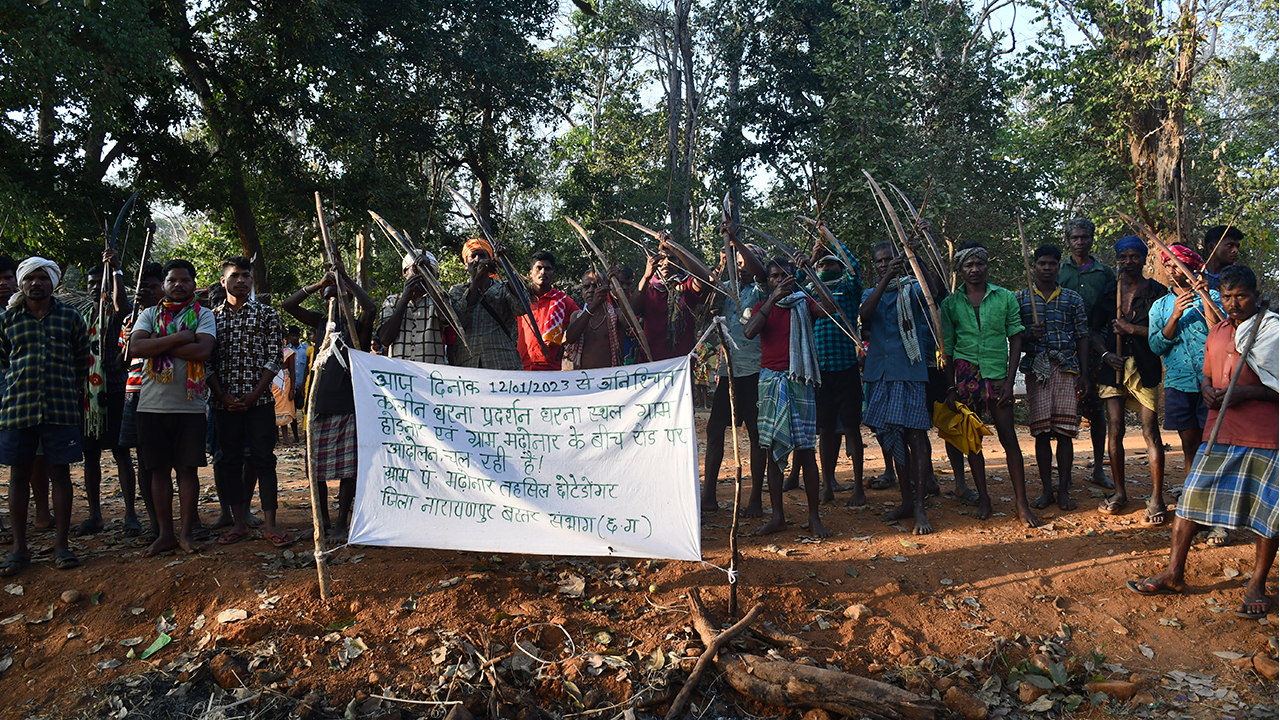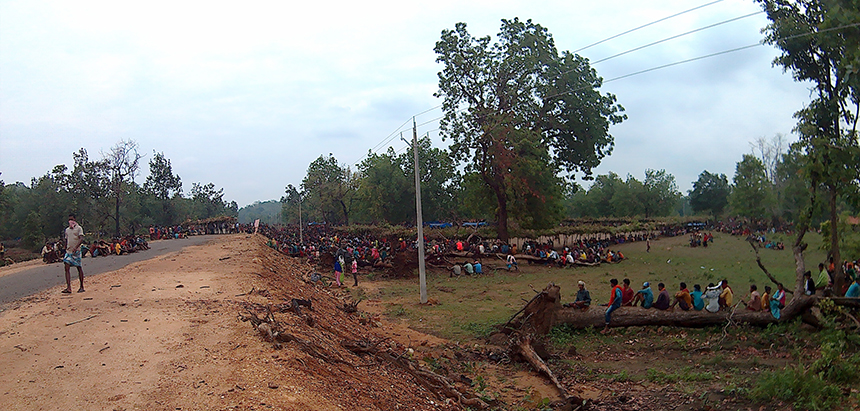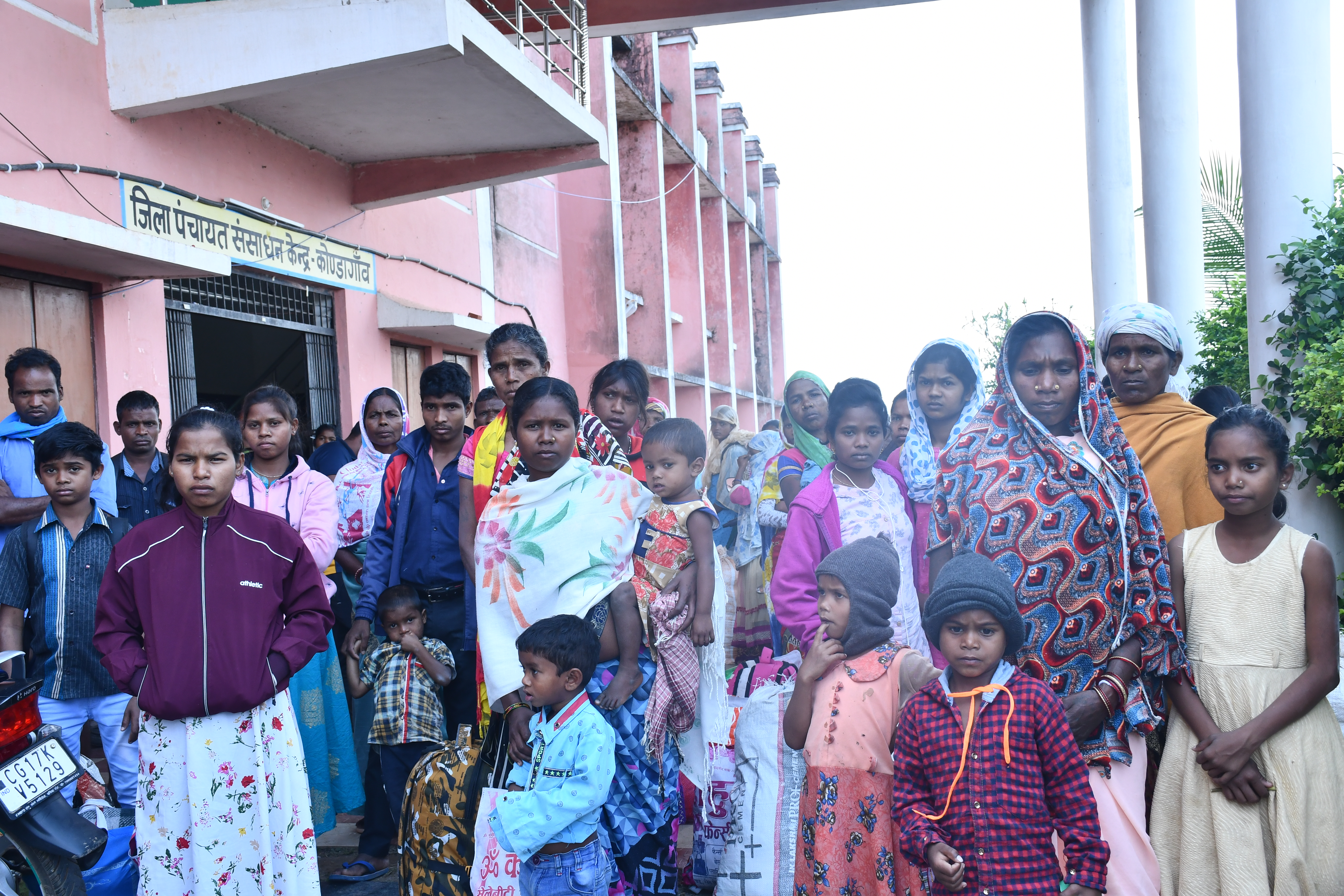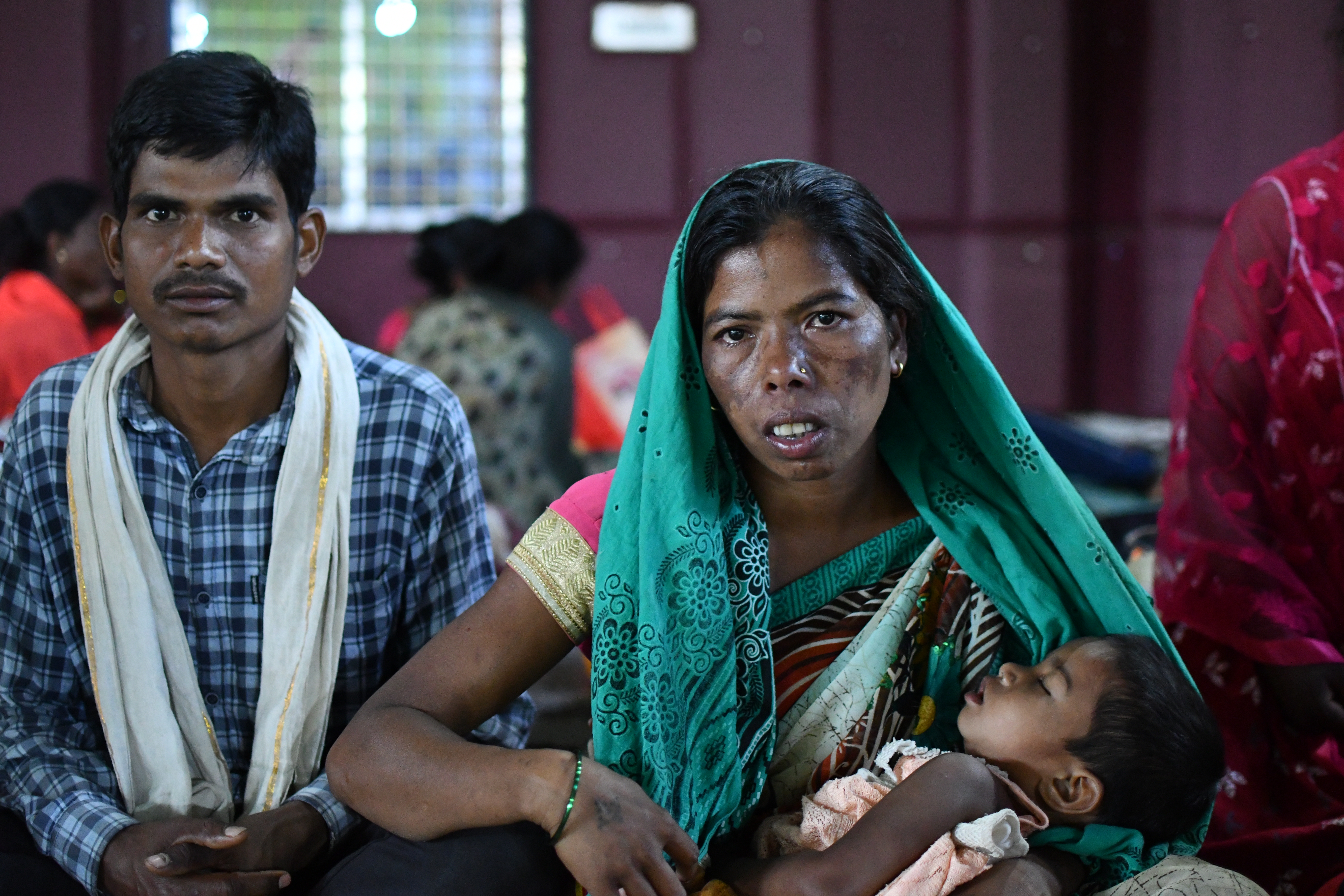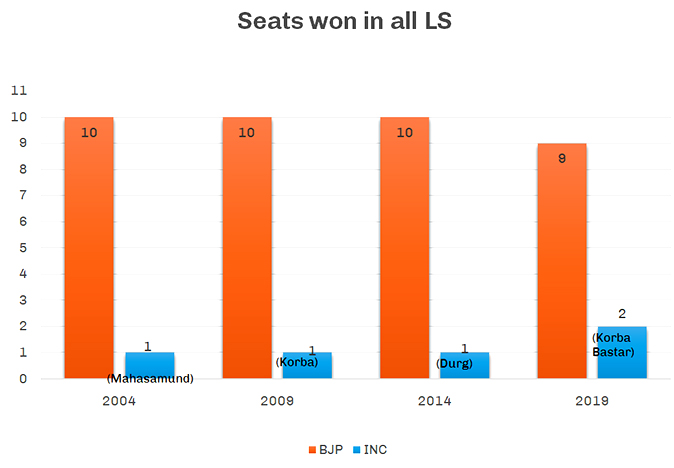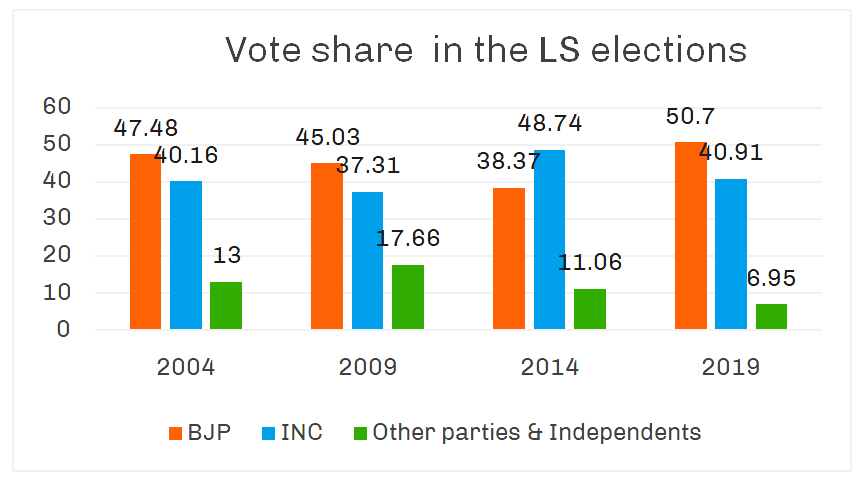The elections, especially in Bastar and Kanker constituencies in Chhattisgarh, will be watched intently. The restive region has always grabbed attention for the untold violence and displacement of local Adivasi residents as the State has fought armed insurgency for over three decades.
Malini Subramaniam
Bastar, Chhattisgarh|April 18, 2024
The 18th Lok Sabha election in Chhattisgarh is scheduled in three phases : April 19th (Bastar), April 26th (Kanker, Mahasamund and Rajnandgaon) and May 9th (Surguja, Raigarh, Janjgir Champa, Korba, Bilaspur, Durg, Raipur).
Although bigger than Bihar state in geographical area, Chhattisgarh contributes 11 seats to the country’s 543-member parliament. Out of the 11 seats, four seats are Scheduled Tribe (ST) reserved constituencies and one Scheduled Caste (SC) reserved seat.
The four Adivasi seats represent 30.62 per cent of the Adivasi population, mostly distributed in the southern and northern parts of the State. SC comprises 12.82 per cent of the state’s total population.
Restive Bastar – for over three decades
Chhattisgarh’s Bastar region, a region as large as the state of Kerala, has two Lok Sabha constituencies (with 12 assembly segments – 11 ST seats and one General) – Bastar and Kanker. Bastar is the only seat in the State to go to polls this Friday, when the country votes for the 18th Lok Sabha election. While Kanker will go to polls on 26th April.
The restive region has always grabbed attention for the untold violence and displacement of local residents as the State has fought armed insurgency for over three decades.
However, Election times are when major political parties promise to end ‘Naxal insurgency’ in a span of five years, then three years as election months come closer; in fact last week stated to have been almost eradicated from all over, but for the ‘fragment lingering in Chhattisgarh”. Ironically, the same minister – Union Home Minister – made all the three statements of a different timeline.
The ‘lingering fragment’ include death of six civilians including a six-month old baby died alleged due to cross-firing in January; death of four central paramilitary armed force and injuries to 14 personnel in a Maoist ambush on 30th January, two state armed personnel fatally injured by an improvised explosive device (IED) on 26th February, 13 alleged Maoists ambushed by security personnel in April and very recently on last Tuesday an encounter in which 29 alleged Maoists were killed by security personnel. The death toll of alleged Maoists is said to be touching 79 since January this year. Details of deaths of alleged Maoists dying in ambushes are primarily press releases by the police. There are instances such as the Chipurbhatti encounter of Bijapur district in which six Maoists were alleged by the police to have been killed or when 13 Maoists were ambushed in the forests between Nendra and Korcholi in Bijapur district. However, reports from local YouTube journalists and human rights activists reveal the absence of ‘alleged ambush’ by the police, in fact pointing to summary killings.
This Lok Sabha election in Bastar region’s Bastar and Kanker constituency is being held in two separate phases, on 19th and 26th April, primarily for security reasons. The region during election time becomes one of the most highly militarised regions. To conduct ‘free and fair election’ in Bastar, an additional 60,000 security personnel have been called in. 14 new security camps have been set up since BJP’s Vishnu Deo Sai’s government took charge in December last year, this in addition to the existing security camps running into several hundred. Police shy away from revealing the exact number of security camps established all over the region citing ‘security reasons.’
Since the formation of the State and despite security threats, elections have been held amidst Maoist call for election boycott. However, over time, the educated youth in Bastar show active socio-economic and political interest – seeking government jobs other than being recruited in the police, educated and conscientious rural youth have come forward to protest against tree-felling and establishing security camps without holding mandatory gram sabhas, their willingness and motivating the elders in the village to participate in the electoral process. Several interior villages, written off as ‘under Naxal influence’, this reporter visited during the assembly elections held in November last year had negotiated with the Maoists and defied their call for boycott of the election, such that ‘we bring in candidates who would work for our welfare’ was their response.
The voter turnout in some of the assembly segments do show marked improvement over the years. In fact, several polling booths in Dantewada, Konta and Bijapur assembly constituencies that had zero turnout, showed encouraging voter turnout in the last assembly election.
Would the Lok Sabha elections draw the villagers out of the interior areas to vote?
“There are only a few in our village who have voter identity cards,” said Assiram Salam, a young higher secondary educated boy from village Aderbeda of Narayanpur district. Assiram along with a number of youths from his village and nearby villages had protested against construction of a road in their village, cutting down resourceful trees to make way for the broad road as well as fearing that they would establish security camps. However, two days back the police came in large numbers and drove away the protestors stating no public gathering is allowed with Section 144 in place due to election. Currently the people are disturbed over their loss of grazing and forest land and trees that are being cut. Neither the Congress nor the BJP government listens to our concerns, why would they even vote for anyone, said Assiram, when asked if villagers would show interest.
“For the Vidhan Sabha election, we were keen to get our voter identity cards made, in fact many from our villages were willing to go with their Aadhar cards to vote,” said Mahesh Sodi, another protestor from Gonderas village in Dantewada district.” However, declaring Gonderas as sensitive, the polling booth was shifted 25 kilometres away in Kondre, making it difficult to reach the polling booth so many dropped out, Sori informed. Villagers in Gonderas have been sitting on a protest against construction of wide roads that involved felling of trees for the last one-and-half years without holding the mandatory Gram Sabha under the Panchayats (Extension to Scheduled Areas) Act (PESA) 1996. The polling booth for Lok Sabha is also set up in Kondre, so it is less likely anyone would go to cast a vote, he added.
Bastar constituency that would go for election this Friday, has 1,961polling booths of which 61 are classified by the Election Commission, with inputs from district police, as vulnerable and 196 as critical. For such booths, extra precaution has been taken with the provision of additional force as well as provision of videography. A total of 14,72,207 voters (7,00,476 Male, 7,71,679 Female and 52 Third Gender) are eligible to cast their votes.
11 Candidates representing BJP, INC, Sarva Adi Dal, Hamar Raj Party, Gondwana Gantantra Party, and others as well as two independent candidates have entered the fray to assess their popularity with the voters. Not a single woman is contesting in either Bastar or Kanker constituencies.
The recent killings in Kanker where 29 Maoists are said to have been ambushed will have a chilling effect on the election. Fear amongst voters and election commission staff could loom dreading Maoist retaliation so it might deter the voters. Further Maoists could further impose ban on voting in interior villages to boycott election, leaving no space for negotiation for those contemplating to vote.
While Naxalism continues to pose a key challenge in Bastar, it overshadows other primary concerns that are key to disentangle itself from the shackles of ‘Naxalism’.
Development – key concern in Bastar
Ironically, development or rather lack of development in Bastar in a people’s framework is a key reason for the discontent of locals tapped by the Maoists to signify their presence as identified in the 2008 Planning Commission document, yet development or rather the kind of development undertaken in Bastar today continues to be a key reason for discontent for local residents leading to widespread protests. And thanks to the presence of the Maoists, the State finds it a good reason to dismiss the genuine concerns raised as ‘Maoist instigated’ and deal with the protestors with a heavy hand.
Development in Bastar is synonymous with construction of roads and security camps. According to the police and administration, roads are said to usher development such as schools, health centres including ambulances reaching remote areas, and security camps are being established to protect the infrastructure including roads from ‘Naxal attacks’. A striking example is that of Chandameta, a remote village in Bastar district close to the borders of Odisha state. Almost a decade back Chandameta was considered a hub of ‘Naxal activity,’ but soon with the laying of broad roads and security camps almost every five kilometres between Darbha and Chandameta, the place is said to have been declared ‘Naxal free,’ however basic development such as health facilities, drinking water, proper functional schools, ration shops in the village are still awaited. The villagers of Chandameta had enthusiastically participated in the assembly elections held November last, however are disappointed at government’s apathy to their needs despite repeated reminders, the local residents have decided to boycott the Lok Sabha elections. Since the government has declared the place ‘Naxal free,’ it cannot attribute such an announcement as ‘Naxal instigated.’
Development remains a poll promise by all political parties during election campaigns, the villagers have over the years little trust on getting basic amenities. “Sarkar ke vikas ki soch aur hamare vikas ki soch me antar hai,” said Panderam Salaam, Sarpanch of village Tursani, who had come to extend support at a protest site in Chilparas last year. Village Chilparas has been on a protest since over a year opposing establishment of a Border Security Force (BSF) camp in their forest patch and laying wide roads through their village. Accusing the then Bhupesh Baghel led Congress government of establishing camps and roads for mining purpose, the Adivasi village elders and leaders had decided to protest.
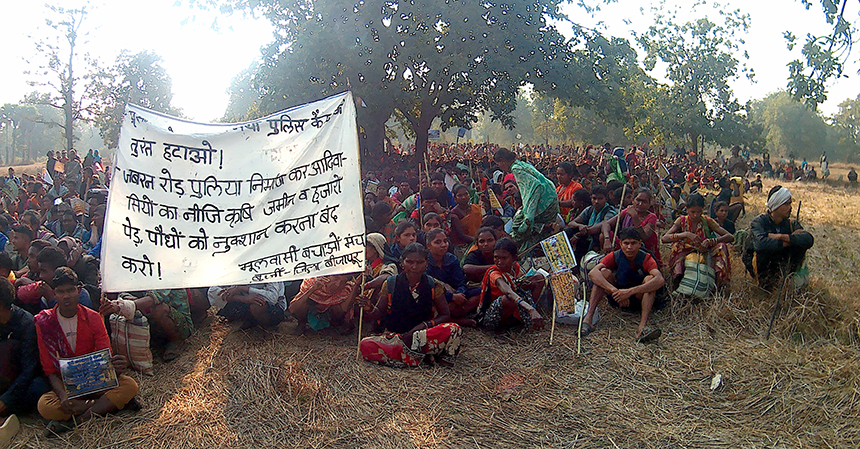
Village youth gathered to protest against wide roads and security camp in Pusnar, Bijapur district (2021)
Banking on polarised votes
The five-year Bhupesh Baghel led government that toppled the three-term Raman Singh led BJP government in 2018 state assembly elections, failed to retain the trust reposed by the people all over Chhattisgarh, including the Adivasi belt of North and South Chhattisgarh thus making way once again for the BJP to form its government. Of 29 Adivasi reserved assembly seats, the BJP won 17 seats in the last assembly election of November 2023, while in 2018, it had won only two seats. In the last five years, when out of power, the BJP consolidated its hold in the Adivasi belt through its RSS affiliates, Hindu Jagran Manch, Vanvasi Kalyan Ashram, Sewa Bharati, Ekal Vidyalaya and one of its new avatars – Anusuchit Jan Jaati Suraksha Manch, to revive Tribal identity politics by aggressively countering evangelical presence in Adivasi regions.
Christian missionary presence in Chhattisgarh dates back to the 1800s according to the Archdiocese of Raipur, however spreading the narrative that conversion has been rampant during the Congress rule in the last five years was successfully rolled out by the BJP to polarise the Adivasi community. This led to violent attacks on the Christian community in Bastar region, especially Kanker, Narayanpur, Kondagaon and Bastar district. The Congress, on the other hand not only looked the other way for fear of losing its hold on the larger Adivasi community, as compared to a miniscule percent of Christian Adivasi, focused its efforts in securing OBC votes and establishing itself as a quasi-pro-Hindu party leading to its collapse in the State. Abandoned by the Congress and targeted by the BJP, the Christian community formed its own political party – Sarva Adi Dal – ‘not to win’ but as a ‘show of strength, and about sending a message to any party that comes to power that they cannot ignore us” as stated by a assembly election candidate in Kondagaon from Sarva Adi Dal. The Sarva Adi Dal garnered only 0.89% votes and all the 10 candidates who contested forfeited their deposits.
The BJP could not have ignored its remarkable win in the Adivasi belt. Vishnu Deo Sai, a staunch RSS cadre and a four-time MLA from Surguja region was made the Chief Minister – the first Adivasi Chief Minister in the state, where every third person is an Adivasi. Sai fits the BJP roadmap for 2024 consolidation, especially across the Adivasi belt in the country.
Continuing to bank on the now polarised Adivasi votes, the BJP has fielded Kailash Kashyap from Bastar and Bhojraj Nag from Kanker. Kashyap, Bastar district president of BJP, is less known as a BJP karyakarta but as the vice-president of Vishwa Hindu Parishad, active member of the Rashtriya SwayamSevak Sangh (RSS), the ideological wing of the BJP leading several anti-conversion rallies under the banner of Bastar Sanskritik Manch. Bhojraj Nag on the other hand won the Antagarh assembly seat in the by-poll election in 2014 but more prominently has been holding public rallies against Christian missionaries as Coordinator of Janjati Suraksha Manch (JSM), a forum backed by Vanvasi Kalyan Ashram, the tribal welfare wing of the RSS.
JSM has been active across the country especially seeking delisting of ‘converted Adivasis’.
Anti-Conversion not a campaign matter ?
At a campaign meeting yesterday (Wednesday, 18th April) held in Burji village of Bastar district under the scorching heat, Kashyap and his supporters reached the less than 100 villagers waiting for him. A few chairs were placed under the large banyan tree, next to where he was seated with a banner of Modi and himself put up by his supporters. “Our candidate is supported thoroughly by the Sangh and Modi guarantee will successfully see him through this election,” said a supporter confident of his win despite voters’ non-familiarity with the candidate.
When Kashyap rose to speak into the mike, he did not fan anti-Christian sentiments, in fact focused on the achievements of the Modi government and fulfilling the Modi guarantee – Rs 1000 per month for women under the Mahatari Vandana scheme, the allocation of houses under the PMAY, purchase of paddy at the rate of Rs 3100 per quintal, hike in purchase of Tendu patta leaves to Rs 5500 (from Congress’ Rs 4000) per standard bag of 1000 bundles of 50 leaves each.
In response to what concerns he would raise in Delhi if elected to power as a parliamentarian, Kashyap rattled off the usual Shiksha, Swasth, Sadak – in sabki maang rakhenge (education, health, roads – we will demand all this). That is something the state government will be looking into, what specific Bastar concerns would be raised in Parliament? Naxalism has to be wiped out, he added. When asked how concerned he is with the conversion of Adivasis into Christian faith, as he had led campaigns against this in the past, Kashyap was dismissive. “Ye mudda sirf Mahesh Kashyap ka hi nahi, pure Bastar Adivasi aur sarkar ki hai” (this is not only the concern of Mahesh Kashyap but of all the Adivasis in Bastar and the government), he responded cryptically. The amended Anti-Conversion Act will be soon brought in, he added before he got into his vehicle to head to another location given the last day of the campaign.
Chhattisgarh has an anti-Conversion law, however the amendment made in 2006 is yet to get the necessary approval.
Bastar district’s Tokapal and Lohandiguda blocks had seen severe anti-Christian violence in the previous years. The villagers of Burgum – men and women – lingered a bit after Kashyap left. Would the anti-Conversion law be welcomed by the villagers in Burgum? “We are keen to protect our culture and faith as practised by the Adivasis, but if anyone in the village converts himself or herself, we will look into the matter and convince the person within our community. We will not go to any political party – it is our business to convince him back. No law can do what we can by engaging with the person,” said Tekurram Kashyap, one of the villagers from Sakargaon who had come to listen to Kashyap.
Tekuram Kashyap’s response dismissed the fear of delisting that was being raked. Surely, as an Adivasi, BJP candidate Kashyap is very well aware of the consequences of delisting Adivasi – it might bring down the reservation for Adivasi seats. In fact, when the anti-Christian riots took place, this reporter had asked Bhojraj Nag, who was then leading the campaign against Christian faith believers, if delisting could result in delimitation of Adivasi reserved constituency. “But why should the Adivasi be turning to other faith,” was his single response, not expanding on the pending anti-conversion law. Perhaps, mere whipping fear garners good votes whether or not the amended law comes into effect.
Rumour has it that the BJP not only whipped the fear among Adivasi Christian faith believers but also convinced them that it is only BJP that would not disturb them and allow them to remain in peace; pointing to Congress’ inaction when there was riots against Christian faith believers.
Modi guarantee resonated better than the Congress promises
While the women spoke of drinking water being their biggest concern, which the candidate did not address, they were happy with the 1000 rupees that had come into their account. During the assembly election, BJP had promised, as one of the Modi guarantees, a scheme called Mahatari Vandana, in which each married woman will get a deposit of 1000 rupees per month – 12000 rupees per annum. The Congress in its manifesto for Lok Sabha election has promised Rs 8333 every month for every married woman i.e. Rs One lakh per annum. Kashyap in his address had run it down – our women’s population in the country runs into millions, can you calculate how much that would be if every woman is given 8000 rupees every month. The Congress will never be able to do that, he had concluded. The men and women nodded and sniggered.
When asked if the women would be tempted to vote for Congress now that they have promised Rs 8000 rupees per month, they were prompt – phool chap (Lotus – the party symbol of BJP) has already given us, haath (hand, the party symbol of Congress) chap is only promising – I’d rather keep what I have, said one of the women who had gathered, declining to give her name. Moreover, we were having drinking water problem for years, we ousted the BJP when they did nothing for us, Congress also did not bring water and we voted them out. In the last six months, since the new BJP government has formed some drilling work for borewell is underway. They still have not got provided water, at least they are attempting to, was their response.
Guarantee vs corruption
Lohandiguda block had voted for the Congress’ then candidate Deepak Bainj, who won over his BJP rival by 17,770 votes in the previous 2018 assembly election, later Bainj contested for the Lok Sabha and won by 38,982 votes. However, his popularity waned soon. Bainj had returned to fight the assembly polls and lost by 8,370 votes. The locals accused him of corruption – releasing contracts only to his family members, that he hardly ever visited their villages or spoke respectfully to the elders. We seek nothing more than a respectful demeanour, Hidme Markam, a member of the Sarva Adivasi Samaj from Takraguda village of Lohandiguda Tehsil had said when this reporter had met him in his village to assess Bainj’s loss.
The winning streak for Congress in the previous Lok Sabha polls was their promise to return the land to the villagers when the Tata’s decided to withdraw from setting the Steel plant in Lohandiguda, an initiative brought by the then BJP government but strongly opposed by the locals. When the Tata’s withdrew from the project in 2016, BJP ducked the demands of the villagers to return their land acquired for the plant. Congress in its campaign of 2018 assembly election promised to return their land if voted to power, which they did. However, in the five year’s duration, the BJP made inroads by polarising the Adivasis on religious lines and accused the Congress of several corruption cases.
The Congress rule was filled with corruption, said Dasrath Mandavi of Burji village – Gouthan ghotala (cow shelter scheme the Congress had introduced), Gobar ghotala (sale of cow dung the Congress had promoted as part of cottage industry) Mahadev App ghotala (the infamous Mahadev betting App case), Mandavi enlisted. So, you will not vote for corrupt leaders? Not at all, he emphasised, never. How does he and the others see the corruption involved in the Electoral bond scheme? The question drew a blank. After a brief explanation, a middle-aged man Farsuram Nag interrupted – look, we have not heard of this nor do we understand such high-level corruption, but Modi has given us what he promised so we do not wish to think too much.
Adivasi seats decisive for contesting parties
The four Adivasi seats, distributed equally in the north (Surguja and Raigarh) and south (Bastar and Kanker) of Chhattisgarh, combined with the lone SC seat (Janjgir Champa) will be decisive for the winning party.
Interestingly, in all the Lok Sabha elections held in the State since 2004 (Chhattisgarh was carved out of Madhya Pradesh in 2000), BJP has won the largest numbers of seats – 10 out of 11. It is only in the 2019 Lok Sabha election that Congress won two seats. In fact, the BJP has consistently held the four Adivasi seats, except in 2019 when Congress wrested the Bastar seat. The Congress held Korba seat in 2009 and 2019, additionally winning the Bastar seat in 2019.
Challenge for the Congress
Will Congress retain its hold on Bastar seat as it had in the previous Lok Sabha election? The responsibility has been vested with five-time MLA Kawasi Lakma, a veteran politician. Lakma had been a cabinet minister in the last Congress government. Highly popular in Konta, the assembly seat he has been holding since 2003, Lakma will be testing his popularity across South Bastar.
In an interview to IBC news channel he shared his plans for Bastar as an MP – to seek rail connectivity of Bastar region to other neighbouring states, raise concerns over Polavaram project, a national project where a dam constructed on Godavari river in Andhra Pradesh is having a ‘sinking’ impact on Konta town and villages in Sukma district in South Bastar, especially during rainy season. In an earlier interview to Indian Express, he referred to the rise in killings in Bastar region soon after the formation of BJP government which was not the case during Congress rule. Another major concern of Bastar is the privatization of Nagarnar Steel Plant, which he said he would oppose taking the concerns to Delhi.
Waning significance of other parties
Although there are 9 other contestants for the Bastar Lok Sabha seat, the fight appears to be reduced only between the Congress and the BJP. The CPI, Bahujan Samaj Party (BSP) and Gondwana Gantantra Party (GGP) have always given a good fight to both the parties, both in the assembly and Lok Sabha elections. In fact in the recent assembly election of November 2023, GGP won one seat, while other parties including BSP and Janta Congress Chhattisgarh (Jogi) are beginning to wane, which could be detrimental for the growth and development of Bastar as the narratives will be restricted between the two fighting parties. The newer parties such as the Hamar Raj Party and Sarva Adi Dal have a long way to go before establishing their trust with the voters.
Malini Subramaniam is an independent journalist from Bastar. Photographs in the article are by the author.

